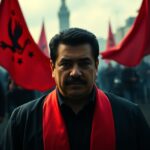Subterfuge surrounds the complex web of the alleged Maduro conspiracy, suggesting that espionage plays an instrumental role in both its formulation and potential execution. As you probe into this volatile situation, you’ll uncover the tactics employed by various players, including foreign nations and opposition groups, that highlight the dangerous implications of political deception. Gaining insight into these shadowy maneuvers not only sheds light on the political climate in Venezuela but also emphasizes the need for vigilance in recognizing the impact of covert operations on democratic institutions.
Historical Context of Espionage in Venezuela
A deep look into Venezuela’s past reveals a landscape shaped by intense political intrigue and foreign interventions. From the struggles against colonial powers to the Cold War years, your understanding of espionage in Venezuela begins with recognizing it as a tool wielded by both local and international actors seeking to influence the nation’s affairs. The fallout from these operations often fueled internal conflicts and shaped Venezuela’s foreign relations. As such, the legacy of espionage remains significant, impacting your perception of contemporary political dynamics.

Key Players in the Alleged Maduro Conspiracy
While the alleged conspiracy surrounding Venezuelan President Nicolás Maduro is shrouded in complex layers, various players have emerged as noteworthy participants in the unfolding drama. Understanding their roles helps illuminate the motives and strategies behind the accusations. These key figures span both domestic and international spheres, signifying a network of influences that shapes the broader narrative of the situation.
Domestic Actors
At the center of the alleged conspiracy are influential domestic actors, including government officials, military personnel, and political dissidents. These individuals play critical roles in navigating Venezuela’s turbulent political landscape, often bringing their own agendas into play that can either support or undermine Maduro’s regime.
International Influences
Across the globe, external factors and foreign agencies have also injected complexities into the alleged Maduro conspiracy. Various nations have interests in Venezuela that can shift dynamics, aligning them with specific domestic actors to further their agendas or impose sanctions that aim to destabilize the current government.
In addition, external nations such as the United States and Russia have demonstrated a keen interest in shaping Venezuela’s political fate, influencing both internal and external perceptions of Maduro. The U.S. sanctions aimed at disrupting the Venezuelan economy and supporting opposition forces are examples of how international meddling complicates the situation. Conversely, nations like Russia provide support to Maduro, presenting a dangerous tug-of-war for influence in the region. These international influences not only amplify the stakes but also potentially lead your understanding of the conspiracy down varying paths, shaped by global priorities and agendas.
Techniques of Espionage and Subterfuge
Even in the context of state-sponsored operations, the techniques of espionage and subterfuge can be quite varied. These methods involve covert actions designed to gather sensitive information or manipulate public perception, often under the radar, and with deniability for the involved parties. By understanding these techniques, you can better appreciate the lengths to which individuals and organizations will go to achieve their goals, particularly in complex situations like the alleged Maduro conspiracy.
Intelligence Gathering Methods
With intelligence gathering methods, operatives utilize a range of strategies to acquire information. This can include human intelligence (HUMINT), signals intelligence (SIGINT), and open-source intelligence (OSINT). These approaches enable you to see how different types of data can be harnessed to construct a comprehensive picture of the adversary’s actions and intentions, ultimately shaping the strategic landscape.
Disinformation Campaigns
Before any successful operation, it’s often important to employ disinformation campaigns that sow confusion and mislead the enemy. These tactics involve the dissemination of false or misleading information, making it challenging for your opponents to ascertain the truth. The impact of disinformation can lead to misguided actions, creating a significant advantage for those who orchestrate these campaigns.
At its core, disinformation campaigns are designed to undermine trust and manipulate perceptions, distorting the reality of the situation. These campaigns can range from simple rumors to elaborate stories that are strategically placed in media outlets or online platforms, impacting your views and actions. The most striking aspect of disinformation is its potential to create rifts within targeted groups, weakening their resolve while engendering chaos around them. When executed effectively, such campaigns serve to enhance the operational effectiveness of espionage efforts, as they can distract targets from realizing they’re being manipulated or spied upon.
Case Studies of Espionage in Latin America
Keep in mind that historical context is vital in understanding the role of espionage in Latin America. Here are several notable case studies:
- Operation Condor (1970s-1980s): A campaign of political repression and state terrorism involving at least six South American countries, leading to numerous human rights abuses.
- Plan Colombia (1999): A U.S.-backed program aimed at combating drug trafficking that included extensive intelligence operations.
- Operation Chavín de Huántar (1997): A successful hostage rescue mission in Peru that relied on intelligence-gathering from various sources.
- The Iran-Contra Affair (1985-1987): A clandestine operation where U.S. funding was funneled to Contra rebels in Nicaragua while diverting weapons sales to Iran.
Comparisons to Previous Scandals
Espionage often draws parallels with other historical scandals, highlighting recurring themes of deception and manipulation.
| Scandal | Key Features |
|---|---|
| Operation Condor | Intergovernmental collaboration, targeting dissidents. |
| Iran-Contra Affair | Covert arms sales and funding for rebel groups. |
Outcomes of Notable Espionage Cases
Above all, you should understand that espionage cases can lead to significant shifts in political dynamics and international relations.
Consequently, reported engagements in espionage have resulted in heightened tensions among nations and significant shifts in political landscapes. Instances like the Iran-Contra Affair not only exposed systemic corruption but also fueled distrust between nations. As you explore these cases, focus on how intelligence operations can yield adverse outcomes, including international sanctions and increased political repression. These ramifications are often long-lasting, affecting how governments operate and interact with each other on a global scale.
Implications for Venezuelan Politics
Not surprisingly, the alleged Maduro conspiracy brings significant implications for your understanding of Venezuelan politics. As allegations of espionage and subterfuge multiply, they create a perception of instability and corruption within the government. This may not only impact local governance but also influence public trust in political institutions, making it challenging for any administration to regain credibility in the eyes of the populace.
Impact on Governance and Stability
Stability in Venezuela is already precarious, and the Maduro conspiracy further exacerbates this situation. Political divisions deepen as allegations surface, leading to a climate of suspicion that undermines effective governance. As public discontent grows, the risk of civil unrest increases, complicating the path toward a peaceful resolution and hindering efforts to stabilize the country.
International Relations Fallout
An evolving narrative surrounding the Maduro conspiracy has significant ramifications for international relations. Your understanding of Venezuela’s standing on the global stage will change as countries reassess their diplomatic strategies. The conspiracy not only strains existing alliances but could also create opportunities for foreign intervention, which may further complicate the region’s security dynamics.
The allegations against Maduro have already begun to shift Venezuela’s relationships with key international players. Western nations are likely to intensify sanctions and diplomatic pressure, while some allies might rally to support the Maduro regime, creating a split in international perspectives. This polarization could lead to a more profound divide in regional alliances and alter your view of the geopolitical landscape in Latin America. Uncertainty in international relations may also embolden non-state actors, posing a serious challenge for both governance and global stability.
Public Perception and Media Representation
Once again, the unfolding events surrounding Nicolás Maduro Moros and 14 Current and Former Officials have caught media attention, shaping public perception through sensationalized reporting. The allegations of narco-terrorism against them have polarized opinions, leading to heated discussions on the legitimacy of these claims and their implications for Venezuelan politics.
Role of Media in Shaping Narratives
On the surface, the media plays a powerful role in constructing narratives surrounding the Maduro conspiracy. Different outlets emphasize various angles, often framing the situation to align with their ideological biases. This can lead to a divided public perception, as the nuances and complexities of the situation become oversimplified in some reports.
Public Response to Allegations
The public’s reaction to the allegations against Nicolás Maduro and his associates is filled with conflicting emotions, including skepticism and outrage. People are questioning the motives behind such accusations, reflecting a widespread mistrust in governmental narratives.
Plus, discussions around these allegations are charged with both fear and hope. Many view the claims of narco-terrorism as a critical turning point for addressing widespread corruption and human rights violations in Venezuela. However, there is also significant concern that this could lead to increased political instability and violence, affecting innocent civilians caught in the crossfire. Your understanding of these dynamics can significantly influence how you perceive these unfolding events.
Summing up
Upon reflecting, you can see that espionage and subterfuge are integral to the alleged Maduro conspiracy. These tactics enable operatives to gather intelligence, mislead adversaries, and maintain strategic advantages, all while complicating the narrative surrounding political power in Venezuela. Understanding their role provides you with deeper insights into the complex dynamics at play within geopolitical conflicts, illustrating how information manipulation can impact both regional stability and international relations.






0 Comments